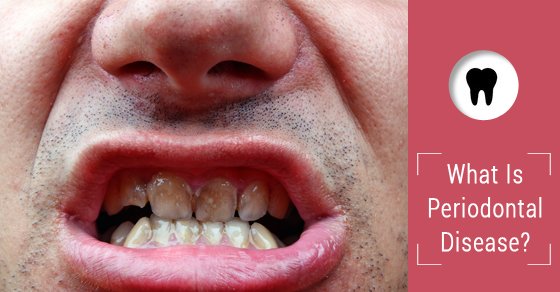Periodontal disease or periodontitis is an infection of the structures that support the teeth such as the gums and the bone. If you’d like a deeper overview, see our explainer on what periodontal disease is. In its earliest stage, periodontal disease appears in the form of gingivitis. If left untreated, periodontal disease can be very dangerous.

How Does Periodontitis Occur?
Periodontal disease occurs when an excessive buildup of bacteria forms on your gum line and between your teeth. This bacteria is known as plaque and your body has trouble fighting it in the same way it can fight off other pathogens. Your immune system tries its best to rid your body of dental plaque which causes your gums to swell and bleed, leading to gingivitis and eventually periodontal disease. Besides the effects of periodontitis on your gums, it can damage your teeth as well. When plaque builds up on your teeth, it hardens over time and turns into tartar, becoming an even bigger magnet for plaque and weakening your teeth’s enamel.
What Causes Gum Disease?
The main cause of periodontitis is poor oral hygiene. In order to prevent gum disease, you need to brush your teeth twice a day, floss once daily, and visit your dentist for regular checkups and cleanings. You may already have a great oral hygiene routine in place and it never hurts to run it by your dentist to make sure you’re flossing and brushing correctly. Gum disease has also been linked in recent years to a number of medical issues like diabetes, blocked arteries, lung infections, and heart disease. The aforementioned medical problems do not cause gum disease, but in fact are made worse because of it.
What are the Signs of Gum Disease?
If you’ve noticed swelling, pain or bleeding around your gum line, you may have gum disease. There are other symptoms you may have noticed in your mouth that are signs of gum disease (you can also review these 10 early warning signs), such as:
- Redness of the gums but no bleeding
- Pain when biting into certain foods
- Bad breath, halitosis or a metallic taste in your mouth
- Receding gums
- Loose teeth
- Abnormal pockets between the teeth and gums
If you notice any of the signs of gum disease, contact us. Periodontal disease must be treated right away before it leads to other dental complications, or potentially tooth loss.